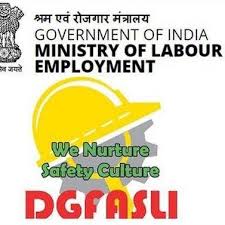Management Of Workplace Hazards course is offered by DGFASLI. To emerge as an organization of excellence in creating knowledge, and formulating policies, standards and practices to ensure safe and healthy workplaces for all in factories and ports.

Management Of Workplace Hazards course is offered by DGFASLI. To emerge as an organization of excellence in creating knowledge, and formulating policies, standards and practices to ensure safe and healthy workplaces for all in factories and ports.
To provide technical advice and service to the Central and State Governments, and workplaces including factories and ports on matters related to safety, health and welfare of workers.
To develop legislations, standards, guidelines and codes of practices consistent with international instruments/standards on Safety, Health and Environment at workplaces.
The office of the Chief Adviser of Factories, which is now called Directorate General, Factory Advice Service and Labour Institutes, was set up in 1945 with the objective of advising Central And State Governments on the administration of the Factories Act and coordinating the factory inspection services in the States.
The Directorate General, Factory Advice and Labour Institutes (DGFASLI) comprise:
Headquarters situated in Mumbai.
Central Labour Institute in Mumbai.
Regional Labour Institutes in Chennai, Kanpur, Kolkata and Faridabad.
Regional Labour Institute at Shillong is under construction.
Regional Labour Institute at Jammu is proposed.
The office of the Chief Adviser of Factories, which is now called Directorate General, Factory Advice Service and Labour Institutes, was set up in 1945 with the objective of advising Central And State Governments on the administration of the Factories Act and coordinating the factory inspection services in the States.
The Directorate General, Factory Advice and Labour Institutes (DGFASLI) comprise:
DGFASLI is a multi-disciplinary organization, the strength of the organization approximately is as follows:
Technical officers 81
Engineers 60
Medical Doctors 07
Industrial Hygienists
Vision
To emerge as an organization of excellence in creating knowledge, and formulating policies, standards and practices to ensure safe and healthy workplaces for all in factories and ports.
Mission
To emerge as an organization of excellence in creating knowledge, and formulating policies, standards and practices to ensure safe and healthy workplaces for all in factories and ports.
Objectives Of DGFASLI
To provide technical advice and service to the Central and State Governments, and workplaces including factories and ports on matters related to safety, health and welfare of workers.
To develop legislations, standards, guidelines and codes of practices consistent with international instruments/standards on Safety, Health and Environment at workplaces.
To conduct studies, surveys and audits in the field of Occupational Safety and Health (OSH).
To enforce and promote Safety, Health and Environment in major ports in India.
To become a national repository of information on OSH and to promote OSH at workplaces.
To conduct seminars, workshops and training programmes on OSH.
To establish and develop research and development in the area of OSH and risk management.
To operate Award Schemes such as PMSA, VRP and NSA
© 2025 coursetakers.com All Rights Reserved. Terms and Conditions of use | Privacy Policy